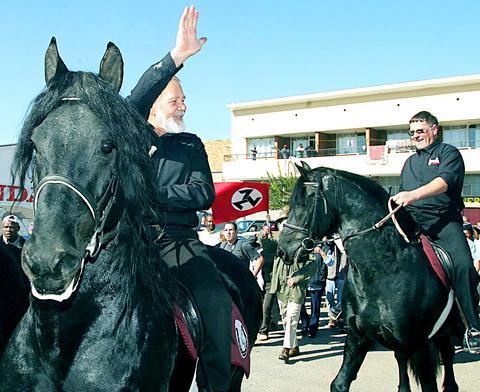With the words of William Wordsworth on his lips and riding on a black stallion, Eugene Terre'Blanche trotted out of jail and back into South African politics yesterday.
A few dozen supporters greeted the white extremist leader with salutes, but they were outnumbered by a jeering crowd of black people.
The Afrikaner Resistance Movement (AWB) billed the rally as the start of a revival: It had waited five years for its leader's release after his conviction for beating up two black men. But just two trucks of members turned up to greet him at the parole office in Potchefstroom, a conservative town 40km west of Johannesburg.

PHOTO: REUTERS
"There is no future for them; I'm just here for the show," said Steven Tsolo, 43, as about 100 black people jogged after Terre'Blanche, chanting, laughing and offering handshakes -- which he declined.
moses
The 60-year-old, trimmer than the stout figure who threatened a race war a decade ago, put on a brave face and cast himself as a reborn Christian who would shun parliamentary politics in favor of leading a cultural crusade to defend the Afrikaans language from encroaching English in post-apartheid South Africa.
"Moses led his people from Egypt into the desert because his people were slaves and God said to take them to freedom ... I am deeper in the knowledge that I am only a man, and that from now on my creator will give the right commands."
From a podium framed by two swastika-like flags, Terre'Blanche said he was a humble citizen who knew his duty to his volk -- his people. "I was never wrong to honor my heritage and answer them when they called me," he said.
Terre'Blanche, a poet who once released a CD of verse, switched to English to regale a press conference with Wordsworth's poem I Wandered Lonely As a Cloud. Reminiscing about his primary school English teacher, he said: "You may think I don't talk English, but English is the most powerful language in the entire world."
fiasco
As apartheid gave way to multiracial elections in 1994, AWB members planted bombs that killed and wounded dozens, but their campaign for an independent white homeland collapsed in ignominy, and the fear inspired by the movement turned to ridicule. A sex scandal further diminished Terre'Blanche's credibility even before he was jailed for assaulting a petrol attendant and attempting to murder a farm worker.
At one point yesterday his horse reared up, but he avoided a repeat of his infamous tumble from the saddle which came to symbolize the AWB's decline.
The rally verged on a fiasco. The brass band consisted of two buglers and the turnout of supporters, dressed in khaki, camouflage and black, was disappointing.
Instead of the 10,000 he once drew, there were closer to 30, bolstered by dozens of journalists.
But in front of the microphone it was vintage Terre'Blanche, orating fluently without notes in a 30-minute speech peppered with references to the volk, Jesus and the Old Testament. He was a master of acoustics: his voice would swell, then suddenly stop, flooding the hall with silence. "Thank you for being a wonderful audience," he said, without apparent irony.

POLITICAL PRISONERS VS DEPORTEES: Venezuela’s prosecutor’s office slammed the call by El Salvador’s leader, accusing him of crimes against humanity Salvadoran President Nayib Bukele on Sunday proposed carrying out a prisoner swap with Venezuela, suggesting he would exchange Venezuelan deportees from the US his government has kept imprisoned for what he called “political prisoners” in Venezuela. In a post on X, directed at Venezuelan President Nicolas Maduro, Bukele listed off a number of family members of high-level opposition figures in Venezuela, journalists and activists detained during the South American government’s electoral crackdown last year. “The only reason they are imprisoned is for having opposed you and your electoral fraud,” he wrote to Maduro. “However, I want to propose a humanitarian agreement that

Young women standing idly around a park in Tokyo’s west suggest that a giant statue of Godzilla is not the only attraction for a record number of foreign tourists. Their faces lit by the cold glow of their phones, the women lining Okubo Park are evidence that sex tourism has developed as a dark flipside to the bustling Kabukicho nightlife district. Increasing numbers of foreign men are flocking to the area after seeing videos on social media. One of the women said that the area near Kabukicho, where Godzilla rumbles and belches smoke atop a cinema, has become a “real

Two Belgian teenagers on Tuesday were charged with wildlife piracy after they were found with thousands of ants packed in test tubes in what Kenyan authorities said was part of a trend in trafficking smaller and lesser-known species. Lornoy David and Seppe Lodewijckx, two 19-year-olds who were arrested on April 5 with 5,000 ants at a guest house, appeared distraught during their appearance before a magistrate in Nairobi and were comforted in the courtroom by relatives. They told the magistrate that they were collecting the ants for fun and did not know that it was illegal. In a separate criminal case, Kenyan Dennis

‘POINT OF NO RETURN’: The Caribbean nation needs increased international funding and support for a multinational force to help police tackle expanding gang violence The top UN official in Haiti on Monday sounded an alarm to the UN Security Council that escalating gang violence is liable to lead the Caribbean nation to “a point of no return.” Special Representative of the UN Secretary-General for Haiti Maria Isabel Salvador said that “Haiti could face total chaos” without increased funding and support for the operation of the Kenya-led multinational force helping Haiti’s police to tackle the gangs’ expanding violence into areas beyond the capital, Port-Au-Prince. Most recently, gangs seized the city of Mirebalais in central Haiti, and during the attack more than 500 prisoners were freed, she said.